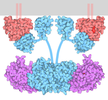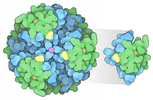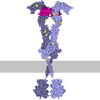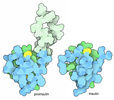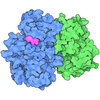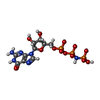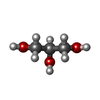+ Open data
Open data
- Basic information
Basic information
| Entry | Database: PDB / ID: 7jih | |||||||||
|---|---|---|---|---|---|---|---|---|---|---|
| Title | HRAS A59E GppNHp | |||||||||
 Components Components | GTPase HRas | |||||||||
 Keywords Keywords | ONCOPROTEIN / Mutant Cancer GTPase | |||||||||
| Function / homology |  Function and homology information Function and homology informationphospholipase C activator activity / GTPase complex / positive regulation of ruffle assembly / oncogene-induced cell senescence / negative regulation of GTPase activity / positive regulation of miRNA metabolic process / T-helper 1 type immune response / positive regulation of wound healing / regulation of neurotransmitter receptor localization to postsynaptic specialization membrane / defense response to protozoan ...phospholipase C activator activity / GTPase complex / positive regulation of ruffle assembly / oncogene-induced cell senescence / negative regulation of GTPase activity / positive regulation of miRNA metabolic process / T-helper 1 type immune response / positive regulation of wound healing / regulation of neurotransmitter receptor localization to postsynaptic specialization membrane / defense response to protozoan / Signaling by RAS GAP mutants / Signaling by RAS GTPase mutants / Activation of RAS in B cells / RAS signaling downstream of NF1 loss-of-function variants / SOS-mediated signalling / Activated NTRK3 signals through RAS / positive regulation of protein targeting to membrane / Activated NTRK2 signals through RAS / SHC1 events in ERBB4 signaling / Signalling to RAS / adipose tissue development / Activated NTRK2 signals through FRS2 and FRS3 / SHC-related events triggered by IGF1R / Estrogen-stimulated signaling through PRKCZ / SHC-mediated cascade:FGFR3 / MET activates RAS signaling / Schwann cell development / SHC-mediated cascade:FGFR2 / Signaling by PDGFRA transmembrane, juxtamembrane and kinase domain mutants / Signaling by PDGFRA extracellular domain mutants / PTK6 Regulates RHO GTPases, RAS GTPase and MAP kinases / SHC-mediated cascade:FGFR4 / Signaling by FGFR4 in disease / Erythropoietin activates RAS / SHC-mediated cascade:FGFR1 / FRS-mediated FGFR3 signaling / Signaling by FLT3 ITD and TKD mutants / protein-membrane adaptor activity / FRS-mediated FGFR2 signaling / FRS-mediated FGFR4 signaling / Signaling by FGFR3 in disease / p38MAPK events / Tie2 Signaling / FRS-mediated FGFR1 signaling / Signaling by FGFR2 in disease / GRB2 events in EGFR signaling / SHC1 events in EGFR signaling / EPHB-mediated forward signaling / Signaling by FLT3 fusion proteins / FLT3 Signaling / Signaling by FGFR1 in disease / myelination / EGFR Transactivation by Gastrin / positive regulation of GTPase activity / NCAM signaling for neurite out-growth / CD209 (DC-SIGN) signaling / positive regulation of MAP kinase activity / GRB2 events in ERBB2 signaling / Downstream signal transduction / Ras activation upon Ca2+ influx through NMDA receptor / SHC1 events in ERBB2 signaling / Insulin receptor signalling cascade / intrinsic apoptotic signaling pathway / Constitutive Signaling by Overexpressed ERBB2 / Signaling by phosphorylated juxtamembrane, extracellular and kinase domain KIT mutants / VEGFR2 mediated cell proliferation / positive regulation of epithelial cell proliferation / small monomeric GTPase / animal organ morphogenesis / regulation of actin cytoskeleton organization / FCERI mediated MAPK activation / positive regulation of JNK cascade / RAF activation / regulation of long-term neuronal synaptic plasticity / Signaling by ERBB2 TMD/JMD mutants / Signaling by high-kinase activity BRAF mutants / Signaling by SCF-KIT / Constitutive Signaling by EGFRvIII / MAP2K and MAPK activation / cellular response to gamma radiation / Signaling by ERBB2 ECD mutants / Signaling by ERBB2 KD Mutants / positive regulation of type II interferon production / positive regulation of fibroblast proliferation / endocytosis / Regulation of RAS by GAPs / RAS processing / chemotaxis / Signaling by RAF1 mutants / Negative regulation of MAPK pathway / Signaling by moderate kinase activity BRAF mutants / Paradoxical activation of RAF signaling by kinase inactive BRAF / Signaling downstream of RAS mutants / GDP binding / cellular senescence / Signaling by BRAF and RAF1 fusions / MAPK cascade / insulin receptor signaling pathway / DAP12 signaling / Constitutive Signaling by Ligand-Responsive EGFR Cancer Variants Similarity search - Function | |||||||||
| Biological species |  Homo sapiens (human) Homo sapiens (human) | |||||||||
| Method |  X-RAY DIFFRACTION / X-RAY DIFFRACTION /  MOLECULAR REPLACEMENT / Resolution: 1.989 Å MOLECULAR REPLACEMENT / Resolution: 1.989 Å | |||||||||
 Authors Authors | Johnson, C.W. / Haigis, K.M. | |||||||||
| Funding support |  United States, 2items United States, 2items
| |||||||||
 Citation Citation |  Journal: Mol.Cell / Year: 2022 Journal: Mol.Cell / Year: 2022Title: Regulation of GTPase function by autophosphorylation. Authors: Johnson, C.W. / Seo, H.S. / Terrell, E.M. / Yang, M.H. / KleinJan, F. / Gebregiworgis, T. / Gasmi-Seabrook, G.M.C. / Geffken, E.A. / Lakhani, J. / Song, K. / Bashyal, P. / Popow, O. / Paulo, ...Authors: Johnson, C.W. / Seo, H.S. / Terrell, E.M. / Yang, M.H. / KleinJan, F. / Gebregiworgis, T. / Gasmi-Seabrook, G.M.C. / Geffken, E.A. / Lakhani, J. / Song, K. / Bashyal, P. / Popow, O. / Paulo, J.A. / Liu, A. / Mattos, C. / Marshall, C.B. / Ikura, M. / Morrison, D.K. / Dhe-Paganon, S. / Haigis, K.M. #1:  Journal: To Be Published Journal: To Be PublishedTitle: Characterization of KRAS4B A59E and A59T oncogenic alleles suggest a novel small GTPase function Authors: Johnson, C.W. / Haigis, K.M. | |||||||||
| History |
|
- Structure visualization
Structure visualization
| Structure viewer | Molecule:  Molmil Molmil Jmol/JSmol Jmol/JSmol |
|---|
- Downloads & links
Downloads & links
- Download
Download
| PDBx/mmCIF format |  7jih.cif.gz 7jih.cif.gz | 81.8 KB | Display |  PDBx/mmCIF format PDBx/mmCIF format |
|---|---|---|---|---|
| PDB format |  pdb7jih.ent.gz pdb7jih.ent.gz | 58.7 KB | Display |  PDB format PDB format |
| PDBx/mmJSON format |  7jih.json.gz 7jih.json.gz | Tree view |  PDBx/mmJSON format PDBx/mmJSON format | |
| Others |  Other downloads Other downloads |
-Validation report
| Arichive directory |  https://data.pdbj.org/pub/pdb/validation_reports/ji/7jih https://data.pdbj.org/pub/pdb/validation_reports/ji/7jih ftp://data.pdbj.org/pub/pdb/validation_reports/ji/7jih ftp://data.pdbj.org/pub/pdb/validation_reports/ji/7jih | HTTPS FTP |
|---|
-Related structure data
| Related structure data | 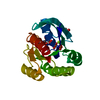 7jifC  7jigC  7jiiC 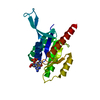 7kmrC 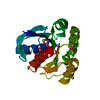 3k8yS S: Starting model for refinement C: citing same article ( |
|---|---|
| Similar structure data |
- Links
Links
- Assembly
Assembly
| Deposited unit | 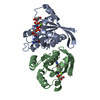
| ||||||||
|---|---|---|---|---|---|---|---|---|---|
| 1 | 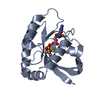
| ||||||||
| 2 | 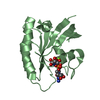
| ||||||||
| Unit cell |
|
- Components
Components
| #1: Protein | Mass: 18933.227 Da / Num. of mol.: 2 / Mutation: A59E Source method: isolated from a genetically manipulated source Source: (gene. exp.)  Homo sapiens (human) / Gene: HRAS, HRAS1 / Production host: Homo sapiens (human) / Gene: HRAS, HRAS1 / Production host:  #2: Chemical | #3: Chemical | #4: Chemical | #5: Water | ChemComp-HOH / | Has ligand of interest | Y | |
|---|
-Experimental details
-Experiment
| Experiment | Method:  X-RAY DIFFRACTION / Number of used crystals: 1 X-RAY DIFFRACTION / Number of used crystals: 1 |
|---|
- Sample preparation
Sample preparation
| Crystal | Density Matthews: 1.86 Å3/Da / Density % sol: 33.78 % |
|---|---|
| Crystal grow | Temperature: 291.15 K / Method: vapor diffusion, hanging drop / pH: 7.5 Details: Starting concentration of HRAS A59T GppNHp was 18.1mg/mL in buffer containing 20mM HEPES, 50mM NaCl, 20mM MgCl2 and 1mM DTT at pH 7.5. Used a 24-well plate sealed with Vaseline and total ...Details: Starting concentration of HRAS A59T GppNHp was 18.1mg/mL in buffer containing 20mM HEPES, 50mM NaCl, 20mM MgCl2 and 1mM DTT at pH 7.5. Used a 24-well plate sealed with Vaseline and total well volumes of 0.402mL. Hanging drops were 0.001mL mother liquor to 0.001mL protein. Mother liquor contained 2.6mM NaCl, 1mM MgCl2, 15.7mM HEPES (pH7.5), 2.5mM DTT, 9.95mM Ca(OAc)2, and 19.9% PEG 3350. |
-Data collection
| Diffraction | Mean temperature: 173.15 K / Serial crystal experiment: N | |||||||||||||||||||||||||||||||||||||||||||||||||||||||||||||||||||||||||||||||||||||||||||||||||||||||||||||||||||||||||||||||||||||||||||||||||||||||||||||||||||||||||||||||||||||||||||||
|---|---|---|---|---|---|---|---|---|---|---|---|---|---|---|---|---|---|---|---|---|---|---|---|---|---|---|---|---|---|---|---|---|---|---|---|---|---|---|---|---|---|---|---|---|---|---|---|---|---|---|---|---|---|---|---|---|---|---|---|---|---|---|---|---|---|---|---|---|---|---|---|---|---|---|---|---|---|---|---|---|---|---|---|---|---|---|---|---|---|---|---|---|---|---|---|---|---|---|---|---|---|---|---|---|---|---|---|---|---|---|---|---|---|---|---|---|---|---|---|---|---|---|---|---|---|---|---|---|---|---|---|---|---|---|---|---|---|---|---|---|---|---|---|---|---|---|---|---|---|---|---|---|---|---|---|---|---|---|---|---|---|---|---|---|---|---|---|---|---|---|---|---|---|---|---|---|---|---|---|---|---|---|---|---|---|---|---|---|---|---|
| Diffraction source | Source:  ROTATING ANODE / Type: RIGAKU MICROMAX-007 HF / Wavelength: 1.54178 Å ROTATING ANODE / Type: RIGAKU MICROMAX-007 HF / Wavelength: 1.54178 Å | |||||||||||||||||||||||||||||||||||||||||||||||||||||||||||||||||||||||||||||||||||||||||||||||||||||||||||||||||||||||||||||||||||||||||||||||||||||||||||||||||||||||||||||||||||||||||||||
| Detector | Type: RIGAKU RAXIS IV++ / Detector: IMAGE PLATE / Date: Mar 21, 2019 | |||||||||||||||||||||||||||||||||||||||||||||||||||||||||||||||||||||||||||||||||||||||||||||||||||||||||||||||||||||||||||||||||||||||||||||||||||||||||||||||||||||||||||||||||||||||||||||
| Radiation | Protocol: SINGLE WAVELENGTH / Monochromatic (M) / Laue (L): M / Scattering type: x-ray | |||||||||||||||||||||||||||||||||||||||||||||||||||||||||||||||||||||||||||||||||||||||||||||||||||||||||||||||||||||||||||||||||||||||||||||||||||||||||||||||||||||||||||||||||||||||||||||
| Radiation wavelength | Wavelength: 1.54178 Å / Relative weight: 1 | |||||||||||||||||||||||||||||||||||||||||||||||||||||||||||||||||||||||||||||||||||||||||||||||||||||||||||||||||||||||||||||||||||||||||||||||||||||||||||||||||||||||||||||||||||||||||||||
| Reflection | Resolution: 1.989→50 Å / Num. obs: 15450 / % possible obs: 80.2 % / Redundancy: 3.3 % / Biso Wilson estimate: 33.18 Å2 / Rmerge(I) obs: 0.083 / Rpim(I) all: 0.051 / Rrim(I) all: 0.098 / Χ2: 0.949 / Net I/σ(I): 6.6 | |||||||||||||||||||||||||||||||||||||||||||||||||||||||||||||||||||||||||||||||||||||||||||||||||||||||||||||||||||||||||||||||||||||||||||||||||||||||||||||||||||||||||||||||||||||||||||||
| Reflection shell | Diffraction-ID: 1
|
- Processing
Processing
| Software |
| ||||||||||||||||||||||||||||||||||||||||||||||||||||||||||||||||||||||||
|---|---|---|---|---|---|---|---|---|---|---|---|---|---|---|---|---|---|---|---|---|---|---|---|---|---|---|---|---|---|---|---|---|---|---|---|---|---|---|---|---|---|---|---|---|---|---|---|---|---|---|---|---|---|---|---|---|---|---|---|---|---|---|---|---|---|---|---|---|---|---|---|---|---|
| Refinement | Method to determine structure:  MOLECULAR REPLACEMENT MOLECULAR REPLACEMENTStarting model: 3K8Y Resolution: 1.989→29.17 Å / SU ML: 0.27 / Cross valid method: THROUGHOUT / σ(F): 1.34 / Phase error: 31.94 / Stereochemistry target values: ML
| ||||||||||||||||||||||||||||||||||||||||||||||||||||||||||||||||||||||||
| Solvent computation | Shrinkage radii: 0.9 Å / VDW probe radii: 1.11 Å / Solvent model: FLAT BULK SOLVENT MODEL | ||||||||||||||||||||||||||||||||||||||||||||||||||||||||||||||||||||||||
| Displacement parameters | Biso max: 72.85 Å2 / Biso mean: 35.3086 Å2 / Biso min: 17.62 Å2 | ||||||||||||||||||||||||||||||||||||||||||||||||||||||||||||||||||||||||
| Refinement step | Cycle: final / Resolution: 1.989→29.17 Å
| ||||||||||||||||||||||||||||||||||||||||||||||||||||||||||||||||||||||||
| Refine LS restraints |
| ||||||||||||||||||||||||||||||||||||||||||||||||||||||||||||||||||||||||
| LS refinement shell | Refine-ID: X-RAY DIFFRACTION / Rfactor Rfree error: 0
|
 Movie
Movie Controller
Controller



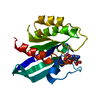
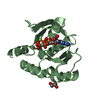
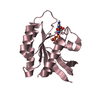
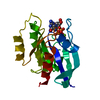
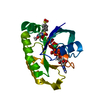
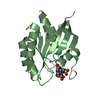
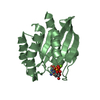
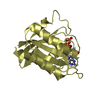

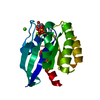
 PDBj
PDBj
